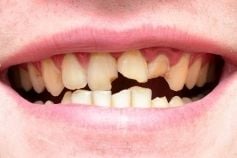A broken tooth can happen to anybody at any stage of life. It can happen accidently due to falling or if anything hits your tooth. Even biting on hard things can cause a tooth to break. In case of a chipped or cracked tooth, you can take a non-emergency appointment to get it treated by your dentist. But, if your tooth is broken, it should be treated immediately. You can, however, give little first aid to the injured tooth to prevent the condition from getting worse.
First Aid for Broken Teeth
 Before you reach your dentist, there are some first aid tips to alleviate the pain and discomfort.
Before you reach your dentist, there are some first aid tips to alleviate the pain and discomfort.
- Save pieces of broken teeth
The good news is if the break is clean, your tooth can be fixed temporarily. So, try to retain the fragments of your tooth. Preserve the pieces in a container with a little bit saline or milk.
- Rinse with warm water
If your tooth is knocked out completely, from the roots, hold it from the top and rinse with lukewarm water. Most importantly, avoid touching the roots or trying to scrape them to remove dust. The dentist may be able to re-implant the knocked out tooth into the socket
- First aid
If you experience bleeding from the affected area, rinse your mouth with cold water. Put a piece of tissue or gauze and press to stop the bleeding. Cold compresses can alleviate pain and swelling.
Broken Teeth Treatment
The treatment for a broken tooth depends upon the intensity of injury. Generally, the treatment involves fixing a replacement, albeit artificial, tooth. This is especially true if your front tooth has broken. The injured tooth is replaced with any one of the following:
- Dental Dentures
Dentures are removable plastic, acrylic or metal crafted teeth. They are clipped onto adjacent teeth using metal clasps.
- Dental Bridge
This is a type of false tooth that is made to look real with the materials like porcelain, glass and ceramic. A bridge is cemented to the gap created by the missing tooth.
- Dental Implant
A dental implant is an artificial tooth that is permanently fixed to the jawbone. It is fixed with the help of a titanium screw that is surgically implanted in the jawbone. Once the screw fuses with the surrounding bone, the abutment is covered with dental crown that looks and functions like a natural tooth.
Additionally, a broken tooth can also be treated using simpler treatment options if the breakage is not severe. Dentists use tooth fillings to fix minor cracks and chips on the exterior part of the tooth, called enamel. Additionally, dental fillings are also used for more serious injuries that involve not only the enamel but also the tooth’s inner layer (dentin). However, in many such cases, placing a dental crown becomes essential. Serious injuries might cause damage to the nerves. Such cases call for root canal treatment, so that the damaged nerves can be removed along with blood vessels.
Tips to Avoid Breakage of Teeth
An accident cannot be avoided, as it can occur all of a sudden. However, the risk of such accidents leading to broken teeth can be lowered with certain precautionary measures. These include:
- Make sure you wear a mouth guard while playing contact sports, such as football. This would not only protect your teeth, it also alleviates the risk of injury to the lips, tongue and cheeks.
- Avoid biting on hard foods, like ice, hard candies, popcorn kernels and tough breads.
- Remember, your teeth are not tools. Don’t use them to cut or pry open packets and bottles.
A broken tooth should be treated and fixed at its earliest, usually within an hour or two from the time of injury. So, contact your dentist immediately after the injury. This will help you get the right treatment and also restore the function and appearance of the affected tooth at the earliest.




